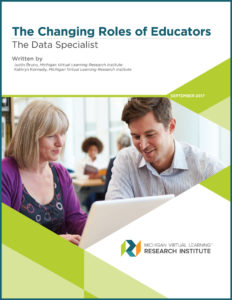ABSTRACT
 This study, the fourth in a series examining the shifts in the roles and responsibilities of K-12 educators as a result of evolving instructional models, focuses on data specialists who help to analyze data and provide just-in-time information to fellow educators to help improve learning outcomes in their school or district. The aim of this study is to better understand the ways in which data specialists, or analysts, inform instructional and other educational practices, as well as to understand their mindsets when working with others to help them incorporate data into their practice. The study also touches on the potential benefits that data specialists anticipate by incorporating data analysis into learning environments. Interviews and focus group responses were characterized by:
This study, the fourth in a series examining the shifts in the roles and responsibilities of K-12 educators as a result of evolving instructional models, focuses on data specialists who help to analyze data and provide just-in-time information to fellow educators to help improve learning outcomes in their school or district. The aim of this study is to better understand the ways in which data specialists, or analysts, inform instructional and other educational practices, as well as to understand their mindsets when working with others to help them incorporate data into their practice. The study also touches on the potential benefits that data specialists anticipate by incorporating data analysis into learning environments. Interviews and focus group responses were characterized by:
- Helping Schools and Educators Understand Data
- Focusing on Change in Practice, Getting Buy-in, and Meeting Student Needs
- Building Supportive and Trusting Relationships
- Seeking Personalized Professional Development
WRITTEN BY:
Justin Bruno, Michigan Virtual Learning Research Institute
Kathryn Kennedy, Michigan Virtual Learning Research Institute
WHAT WE ALREADY KNOW ABOUT THIS TOPIC:
Use of data for decision-making is key in K-12 schools. The field of data analytics is a growing one and is informing the mindful use of technology in capturing key points of data that help to illuminate student learning. Every year, new technologies are created to further the data analytics field, opening up more possibilities for educators to learn from that data and meet their students’ needs more effectively.
WHAT THIS REPORT ADDS:
This report focuses on exploring a new role that educators are starting to take on in schools because of the shift in instructional methods. This role is the data specialist or analyst. These educators, like some of the educators interviewed for this study, typically shift from their teaching position after being identified as someone who uses data to inform their instructional practice and are singled out as being the ones to help inform the entire school or even district reform processes. This new role, and the educators who fill it, are dedicated to helping with system-level change based on what data say about what’s working and what’s not working at the district-, school-, and classroom-levels. They concentrate on building meaningful relationships to establish trust with all of the stakeholders with whom they work in order to inform the change process for the system at large.
IMPLICATIONS FOR PRACTICE AND/OR POLICY:
For practice, the findings for this study point to the need for systems to look within to find the data-driven decision makers who like to analyze all of the moving parts of the system to see how best to align everything for meaningful change. Also important is to concentrate not only on the findings from the data specialist as making improvements but also celebrating what is working well. Another one of the key findings from this is establishing an understanding across the field that the data specialist is there to inform and empower other educators to choose technologies that will offer the data necessary to help make key system-wide improvements. Rather than being there to do the data analysis and interpretation, data specialists are there to teach fellow educators how to collect, analyze, and interpret the data to make meaningful changes within their classroom, schools, and districts.